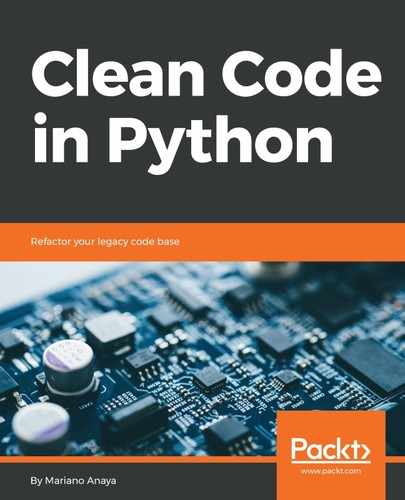The interface segregation principle (ISP) provides some guidelines over an idea that we have revisited quite repeatedly already: that interfaces should be small.
In object-oriented terms, an interface is represented by the set of methods an object exposes. This is to say that all the messages that an object is able to receive or interpret constitute its interface, and this is what other clients can request. The interface separates the definition of the exposed behavior for a class from its implementation.
In Python, interfaces are implicitly defined by a class according to its methods. This is because Python follows the so-called duck typing principle.
Traditionally, the idea behind duck typing was that any object is really represented by the methods it has, and by what it is capable of doing. This means that, regardless of the type of the class, its name, its docstring, class attributes, or instance attributes, what ultimately defines the essence of the object are the methods it has. The methods defined on a class (what it knows how to do) are what determines what that object will actually be. It was called duck typing because of the idea that "If it walks like a duck, and quacks like a duck, it must be a duck."
For a long time, duck typing was the sole way interfaces were defined in Python. Later on, Python 3 (PEP-3119) introduced the concept of abstract base classes as a way to define interfaces in a different way. The basic idea of abstract base classes is that they define a basic behavior or interface that some derived classes are responsible for implementing. This is useful in situations where we want to make sure that certain critical methods are actually overridden, and it also works as a mechanism for overriding or extending the functionality of methods such as isinstance().
This module also contains a way of registering some types as part of a hierarchy, in what is called a virtual subclass. The idea is that this extends the concept of duck typing a little bit further by adding a new criterion—walks like a duck, quacks like a duck, or... it says it is a duck.
These notions of how Python interprets interfaces are important for understanding this principle and the next one.
In abstract terms, this means that the ISP states that, when we define an interface that provides multiple methods, it is better to instead break it down into multiple ones, each one containing fewer methods (preferably just one), with a very specific and accurate scope. By separating interfaces into the smallest possible units, to favor code reusability, each class that wants to implement one of these interfaces will most likely be highly cohesive given that it has a quite definite behavior and set of responsibilities.
